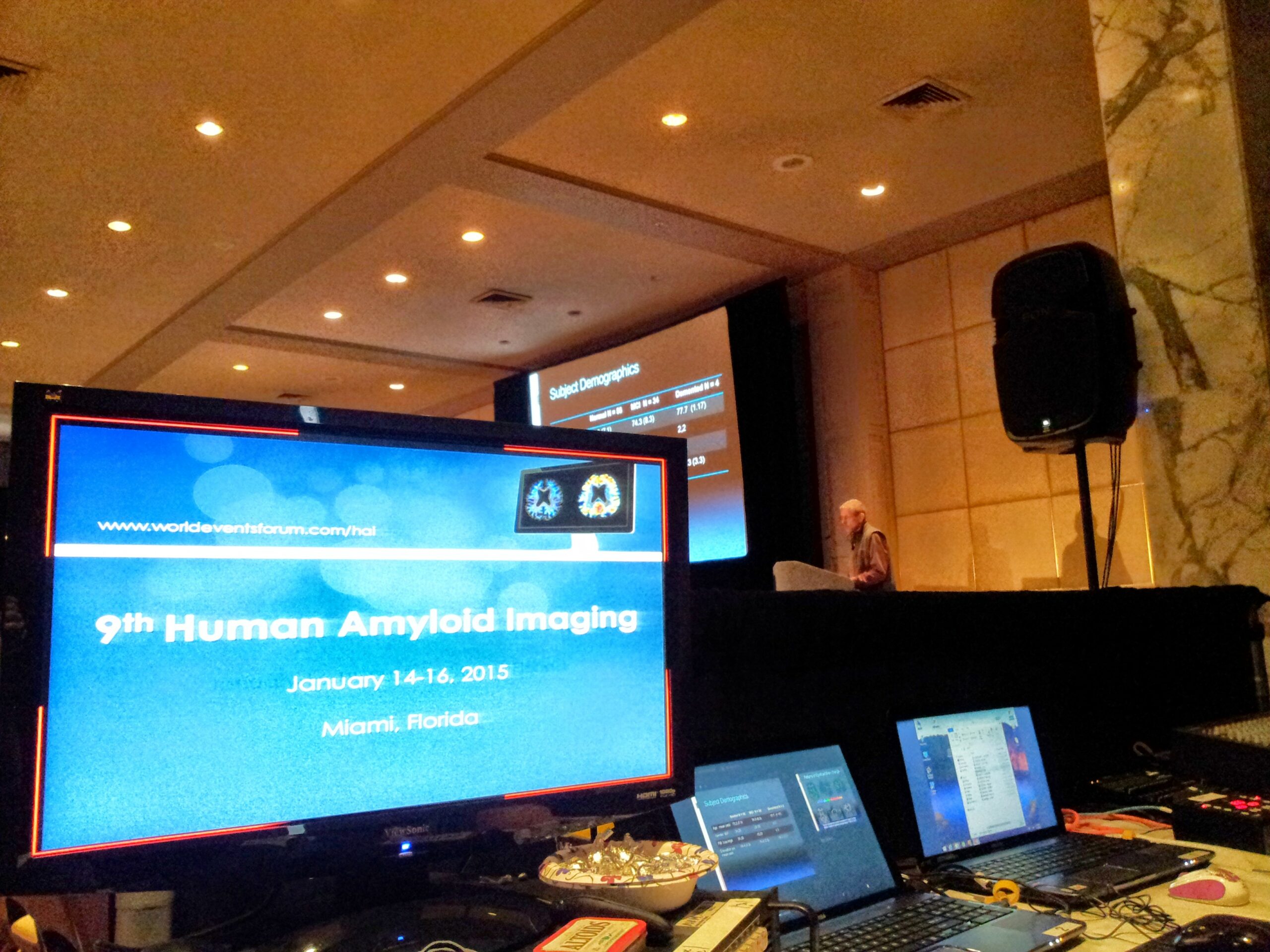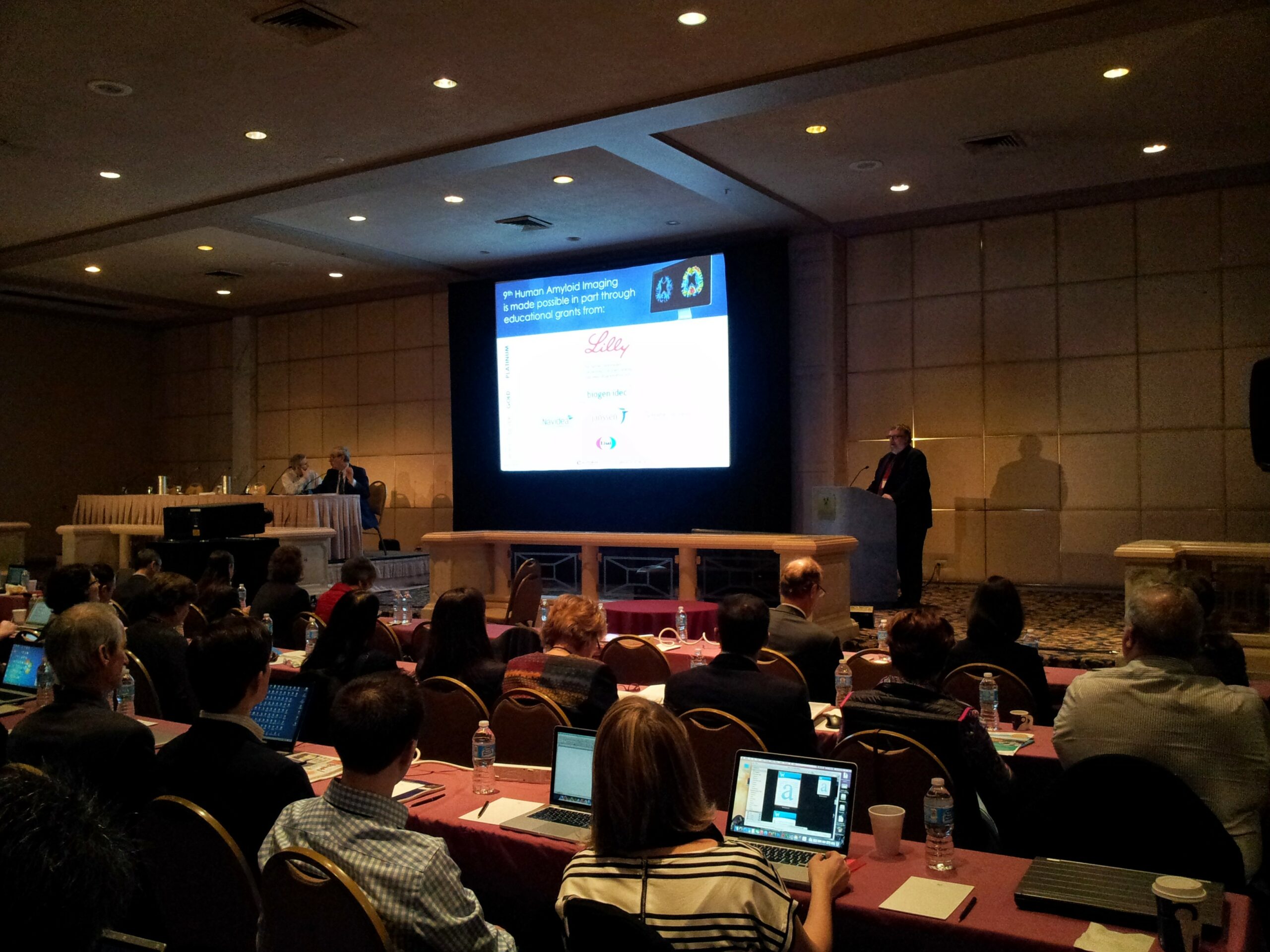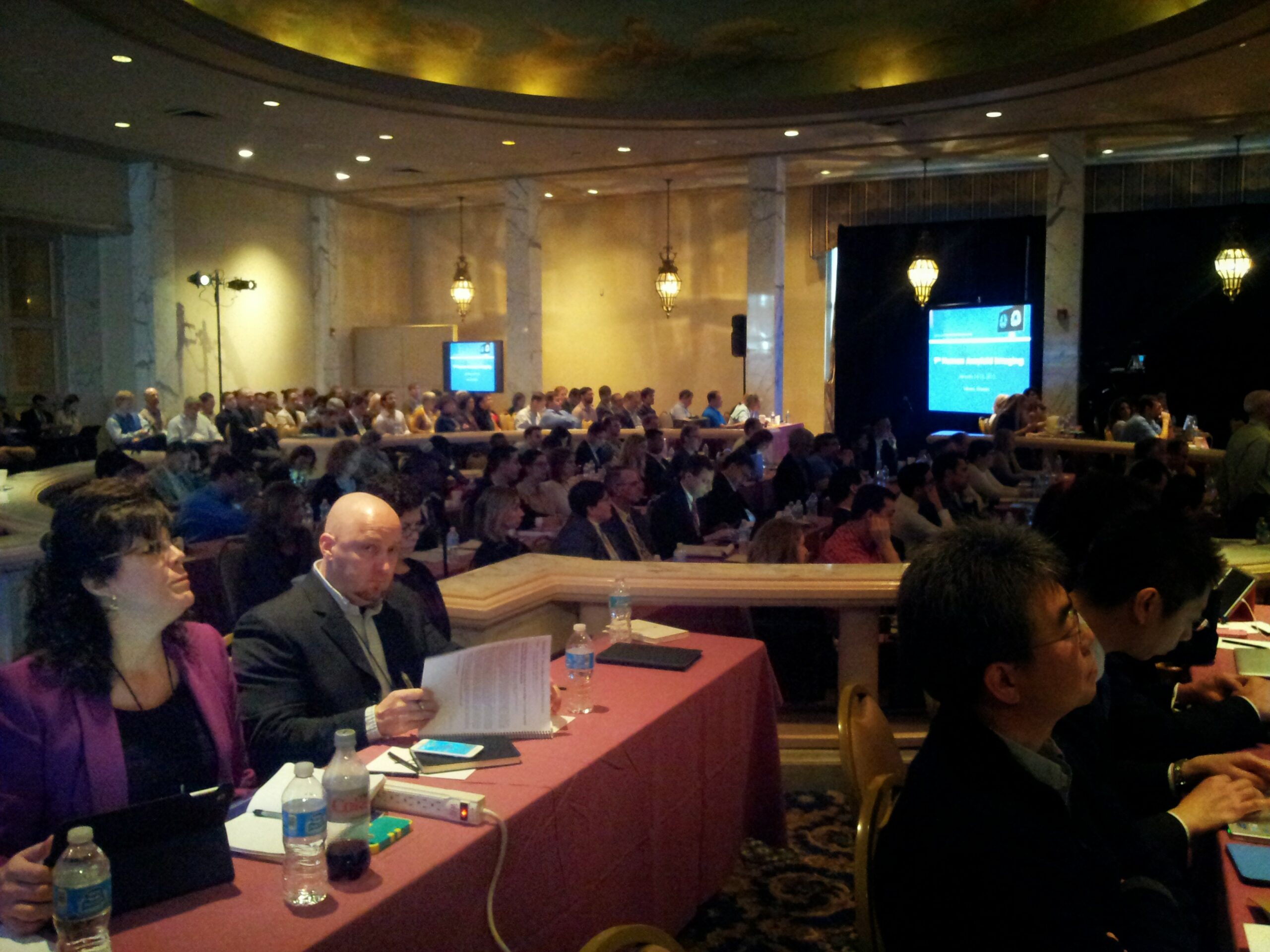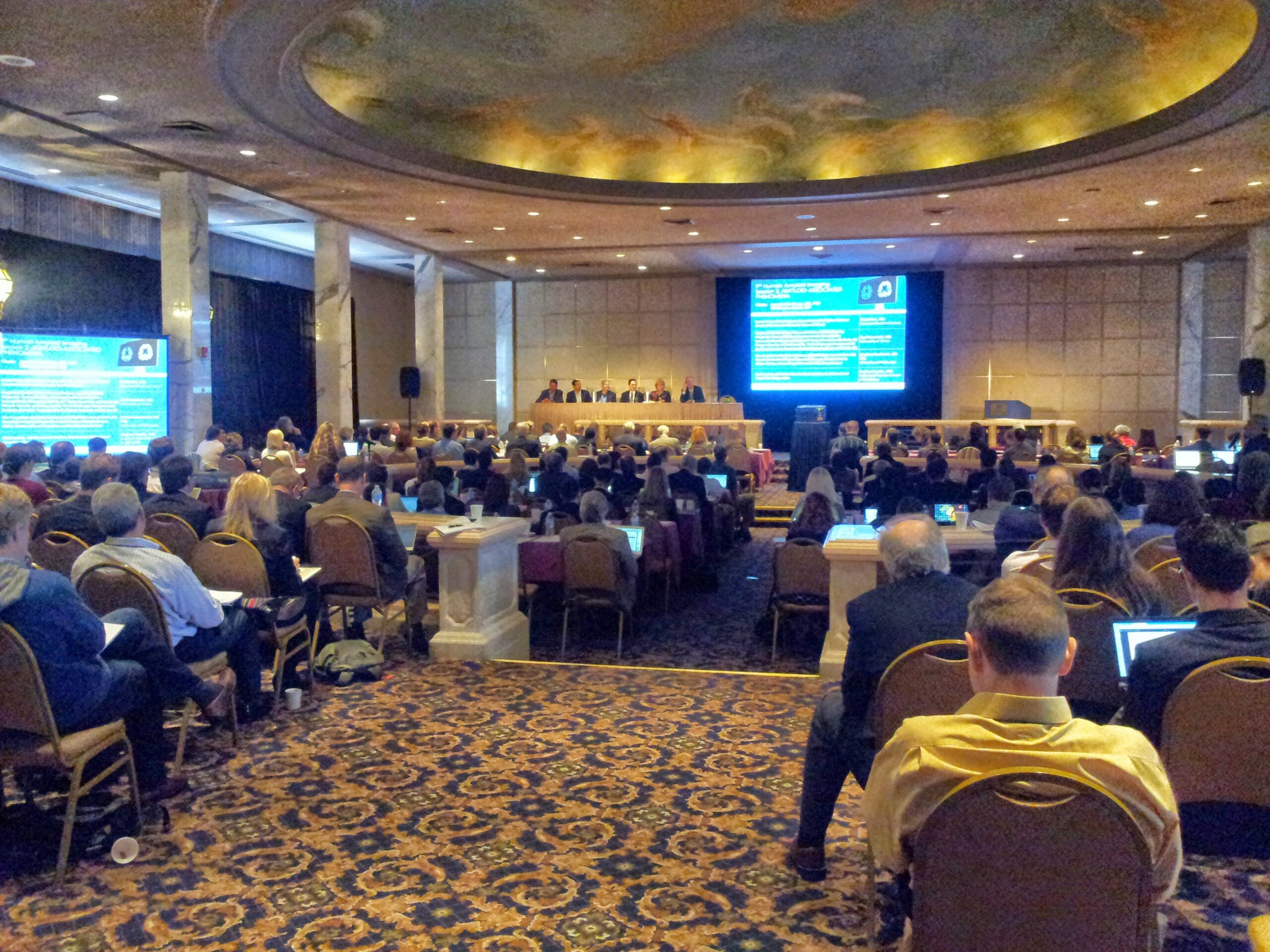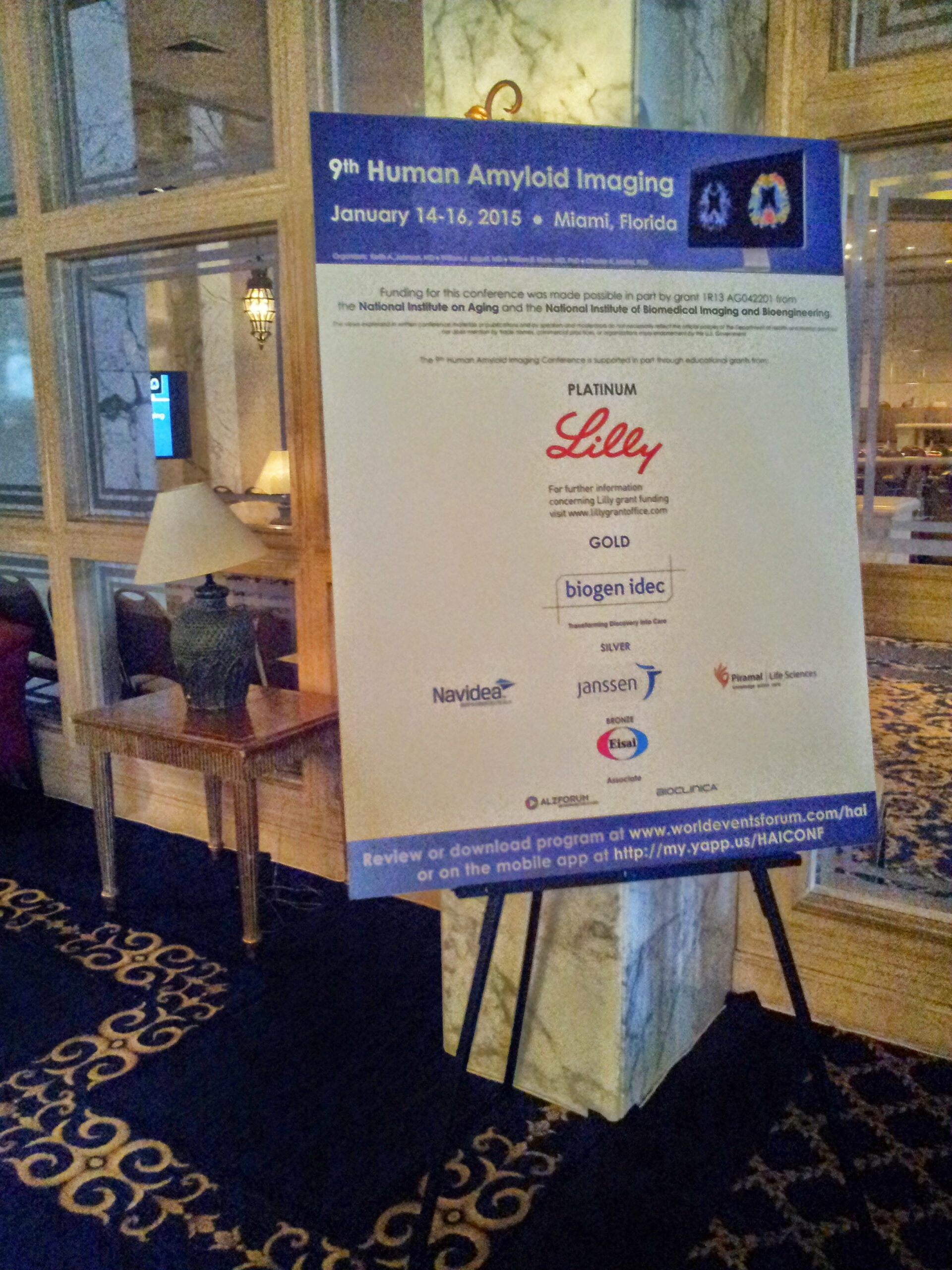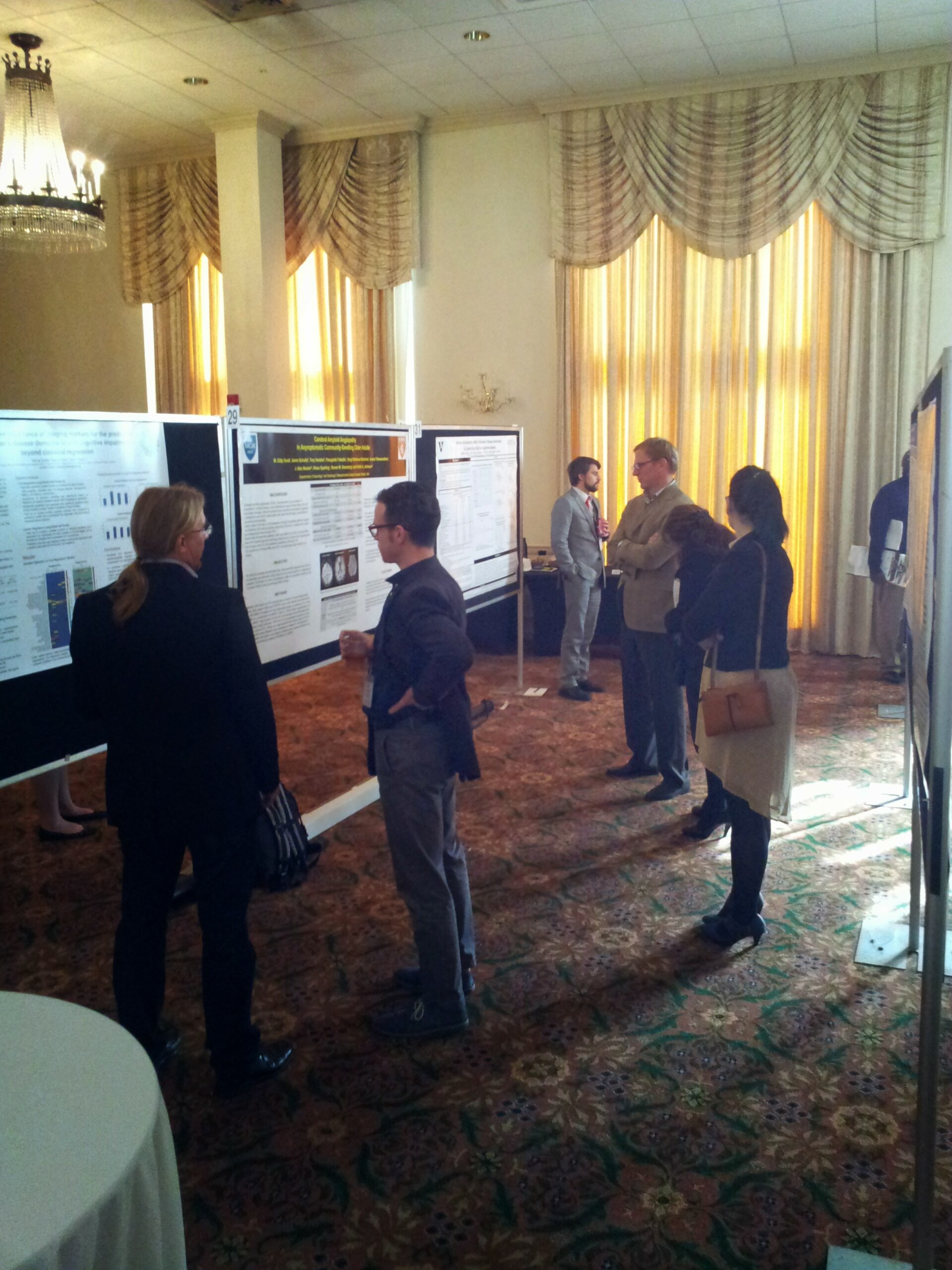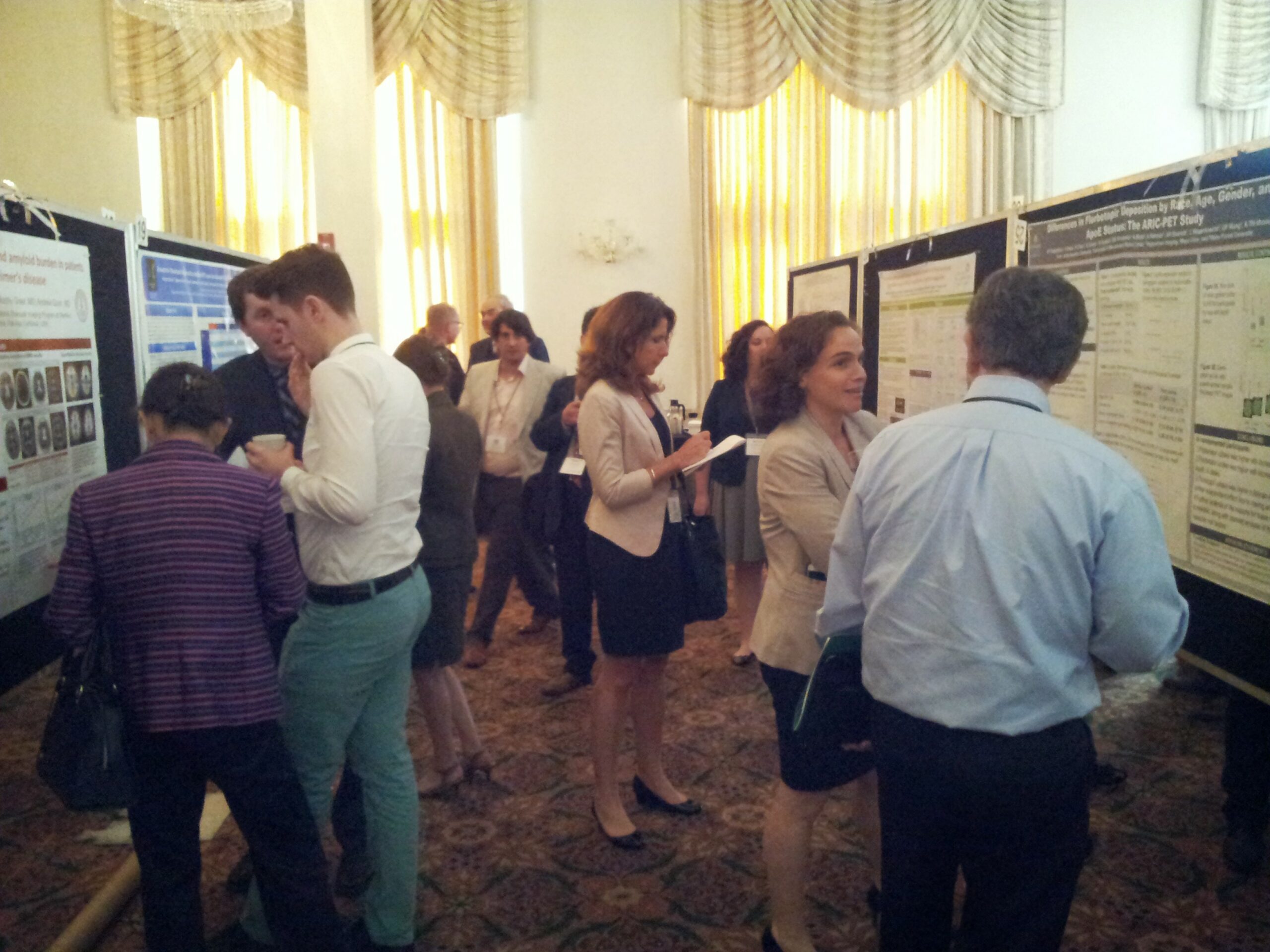HISTORY
HAI ACROSS TIME
The first HAI was held in Boston in April 2007. This initial meeting was quickly organized, but drew considerable interest from about a dozen laboratories in the US, UK, Europe, and Japan. Registration was done online with no fee, and there were approximately 150 attendees. The meeting format of brief talks and abundant discussion was immediately recognized as a success. The reason for its continued success is probably that speakers are asked to omit basic background slides, which consume so much time at most meetings, and present for only seven minutes. Then, after each talk, discussion is led by the Chairs and includes active audience participation. This has succeeded because, unlike larger gatherings with much less time for discussion, each point of discussion is given time for consideration by several participants. With sufficient time, detailed answers (or explanations of non-answers) can be aired and clarified by those who often have substantial recent experience with a given issue. Our first Keynote speakers were Drs. Dennis Selkoe and Bradley Hyman from Boston.
In the following five years, the basic format of sessions and talks was retained, but we began to see new forms of data, such as longitudinal studies and an ever-increasing body of neuropathologic correlational data.
In 2011, the HAI was held as a stand-alone, two-day meeting that was independent of the AAN/ADRC/ADNI meetings. Attendance was approximately 200 and the results of the post-event survey distributed to attendees substantiated the fact that the interest level exhibited by the community could sustain the new two-day format.
Starting with 2012, the HAI successfully continued this structure (continuously adding more registrants, counting closer to 350 in 2015) and appended a welcome reception that allowed attendees to expand on their networking time.
In 2015 the meeting piloted an additional half-day focusing on advances in tau PET and continued from that point with a 2.5 day structure.
Attendance now counts over 400 individuals from top research centers of the Americas, Europe, Far East and Australia.
2023-2025 EXECUTIVE COMMITTEE
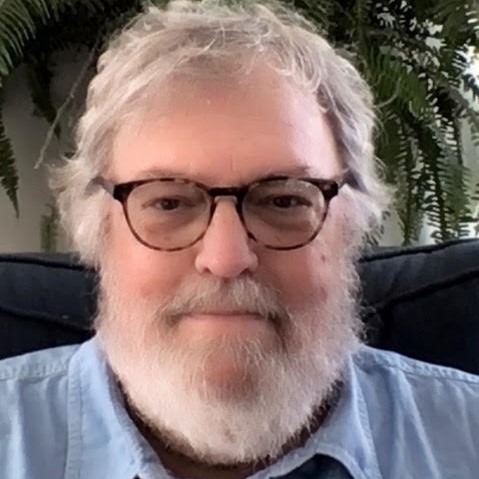
Keith Johnson, MD
Professor, Massachusetts General Hospital
Short Bio
Keith A. Johnson, MD, is Professor of Radiology and Neurology at the Harvard Medical School. He is also Associate Radiologist and the Director of Molecular Neuroimaging in the Division of Nuclear Medicine and Molecular Imaging (Department of Radiology) at the Massachusetts General Hospital (MGH). Dr. Johnson also serves as an associate physician and staff neurologist in the Memory Disorders Unit at the Brigham and Women’s Hospital as well as a Clinical Associate in Neurology at the MGH.
Dr. Johnson is co-director of the Neuroimaging Program of the Massachusetts Alzheimer’s Disease Research Center and its Dominantly Inherited Alzheimer Network (DIAN) research initiatives. He oversees the Clinical Brain Positron Emission Tomography (PET) Service at the MGH and also practices as a neurologist specializing in neurodegenerative disorders.
Dr. Johnson’s major research interests include normal brain aging and the early diagnosis and treatment monitoring of neurodegenerative diseases, including Alzheimer’s disease, Parkinson’s disease, and dementia with Lewy bodies.

Maria Carrillo, PhD
Chief Science Officer, Alzheimer's Association
Short Bio
As CSO, Maria Carrillo, PhD, sets the strategic vision for the Alzheimer’s Association global research program. Dr. Carrillo oversees the implementation of the Association’s growing portfolio of research initiatives, including the Alzheimer’s Association International Conference® (AAIC®), the world’s largest and most influential dementia science meeting, and the Research Roundtable, which enables international scientific, industry and government leaders to work together to overcome shared obstacles in Alzheimer’s science and drug development. In addition, Carrillo manages the World Wide Alzheimer’s Disease Neuroimaging Initiative (WW-ADNI), a multi-country research effort aimed at accelerating the early detection of Alzheimer’s.
Under Dr. Carrillo’s direction, the Association’s leadership in Alzheimer’s research continues to thrive through its International Research Grants Program, which has invested over $475 million in promising and innovative science since 1982. In addition, the Association has expanded its role in advancing dementia science by becoming directly involved in research. Dr. Carrillo is a co-primary investigator for the Association-funded and -led U.S. POINTER study, a lifestyle intervention trial to prevent cognitive decline and dementia.
Dr. Carrillo earned her doctorate from Northwestern University’s Institute for Neuroscience and completed a postdoctoral fellowship focused on Alzheimer’s brain imaging and risk factors at Rush University Medical Center in Chicago.
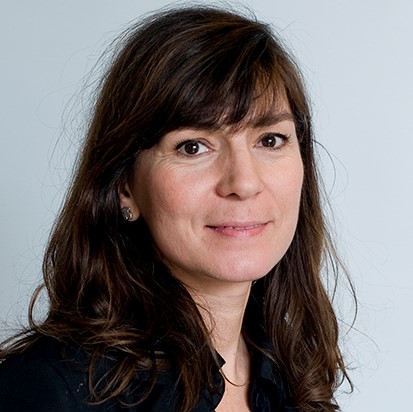
Teresa Gomez-Isla, MD, PhD
Professor, Massachusetts General Hospital
Short Bio
Dr. Gomez-Isla received her medical school training at the University Complutense, Madrid, Spain and completed her residency in neurology at the Hospital Doce de Octubre, Madrid, Spain. She then completed a clinical and research fellowship in the Memory Disorders and Alzheimer’s Research Laboratory of MGH. She has subserved as Chief of the Memory Disorder’s Unit at Clinica Universitaria of Navarre, Pamplona, Spain, and Hospital Santa Cruz y San Pablo, Barcelona, Spain. Dr. Gomez-Isla sees patients and conducts clinical research at the MGH, and also performs basic research at the MassGeneral Institute for Neurodegenerative Disease.

Thomas Karikari, PhD
Assistant Professor, University of Pittsburgh
Short Bio
Dr. Karikari received his PhD in life sciences, with a specialization in neuroscience, from the University of Warwick in the United Kingdom. Following a visiting postdoctoral fellowship at Harvard Medical School, he completed his postdoctoral training in the Department of Psychiatry and Neurochemistry at the University of Gothenburg in Sweden. Dr. Karikari served as assistant professor at the University of Gothenburg until joining the Pitt Department of Psychiatry faculty.
Dr. Karikari’s research aims to further understand the molecular and biochemical basis of pathological brain changes that occur in Alzheimer’s patients, and to apply this knowledge to develop new biofluid-based diagnostic tools for clinical use. As a postdoctoral scholar, Dr. Karikari developed the most widely used and reliable blood test for Alzheimer’s disease to date, which reliably quantifies blood p-tau across all age groups to enable diagnosis and prognosis. In the Department of Psychiatry, he serves as director of the Mass Spectrometry Biomarker Laboratory and of the Single Molecule Array (SIMOA) Biomarker Program. He collaborates with multiple Pitt Psychiatry investigators in the field of Alzheimer’s disease research and leads the Fluid Biomarker Core of the recently renewed National Institute on Aging Alzheimer’s Program Project Grant (Multiple principal investigators: Ann Cohen, PhD; Howard Aizenstein, MD, PhD; Victor Villemagne, MD; Milos Ikonomovic, MD).

Beth Mormino, PhD
Assistant Professor, Stanford University
Short Bio
Dr. Beth Mormino completed a PhD in Neuroscience at UC Berkeley in the laboratory of Dr. William Jagust, where she performed some of the initial studies applying Amyloid PET with the tracer PIB to clinically normal older individuals. This initial work provided evidence that the pathophysiological processes of Alzheimer’s disease begin years before clinical symptoms and are associated with subtle changes to brain regions critical for memory. During her postdoctoral fellowship with Drs. Reisa Sperling and Keith Johnson at Massachusetts General Hospital she used multimodal imaging techniques to understand longitudinal cognitive changes among individuals classified as preclinical AD. In 2017, Dr. Mormino joined the faculty at Stanford University in the department of Neurology and Neurological Sciences. Her research program focuses on combining imaging and genetics to predict cognitive trajectories over time, and the integration of novel PET scans to better understand human aging and neurodegenerative diseases.

Julie Price, PhD
Professor, Massachusetts General Hospital
Short Bio
Julie Price, PhD is an Investigator and Professor in the Department of Radiology at Massachusetts General Hospital, Harvard Medical School and Director of PET Pharmacokinetic Modeling at the Athinoula A. Martinos Center for Biomedical Imaging.
Her expertise is in PET imaging methodology for translational imaging of protein targets in aging, neurodegeneration, and neuropsychiatric disorders. Her primary PET research is focused on in vivo quantification of amyloid-beta and tau deposits in neurodegeneration.
She completed physics (BS) and medical physics (MS) degrees at the University of Wisconsin-Madison, doctoral training (specializing in radiation health sciences) at Johns Hopkins University (PhD), and postdoctoral training at the NIH PET/Nuclear Medicine Department. She served as Chair of the NIH Clinical Neuroscience and Neurodegeneration study section (2013-2015) and on the Advisory Council to the Director of NIH Center for Scientific Review (2017-2021). She is a 2021 Fellow of the Society of Nuclear Medicine and Molecular Imaging (SNMMI), 2021 SNMMI Brain Imaging Council Kuhl-Lassen awardee, and a recipient of the MGH Department of Radiology Thrall mentoring award.
2007 – 2020 EXECUTIVE COMMITTEE

KEITH A. JOHNSON, MD
Short Bio
Keith A. Johnson, MD, is Professor of Radiology and Neurology at the Harvard Medical School. He is also Associate Radiologist and the Director of Molecular Neuroimaging in the Division of Nuclear Medicine and Molecular Imaging (Department of Radiology) at the Massachusetts General Hospital (MGH). Dr. Johnson also serves as an associate physician and staff neurologist in the Memory Disorders Unit at the Brigham and Women’s Hospital as well as a Clinical Associate in Neurology at the MGH.
Dr. Johnson is co-director of the Neuroimaging Program of the Massachusetts Alzheimer’s Disease Research Center and its Dominantly Inherited Alzheimer Network (DIAN) research initiatives. He oversees the Clinical Brain Positron Emission Tomography (PET) Service at the MGH and also practices as a neurologist specializing in neurodegenerative disorders.
Dr. Johnson’s major research interests include normal brain aging and the early diagnosis and treatment monitoring of neurodegenerative diseases, including Alzheimer’s disease, Parkinson’s disease, and dementia with Lewy bodies.

WILLIAM J. JAGUST, MD
Short Bio
William J. Jagust, MD, is Professor of Public Health and Neuroscience at the University of California, Berkeley. Research in his lab is aimed at understanding the structural, functional and biochemical basis of brain aging and neurodegenerative diseases associated with brain aging.
Dr. Jagust uses techniques of positron emission tomography (PET), magnetic resonance imaging (MRI), functional MRI, and neuropsychology and cognitive neuroscience to study normal older people, and patients with neurodegenerative disorders of Alzheimer’s disease and related dementias and Parkinson’s disease. Studies are using PET imaging to detect the deposition of brain amyloid, and we are also looking at how changes in neurotransmitters are related to behavioral changes in aging.
His research focus includes early detection of Alzheimer-related changes with PET and MRI scanning, using imaging to track treatments in both Alzheimer’s and Parkinson’s disease, and understanding the fundamental mechanisms of cognitive change in the aging brain.

WILLIAM KLUNK, MD, PhD
Short Bio
William E. Klunk, MD, PhD, is co-director of the Alzheimer Disease Research Center at UPMC and professor of psychiatry and neurology at the University of Pittsburgh. Dr. Klunk is a pioneer in the field of in vivo amyloid imaging in humans. His work spans from basic synthetic chemistry and neuropharmacological evaluation of amyloid imaging tracers to human positron emission tomography (PET) studies of these tracers. His group’s paper on imaging the pathology of Alzheimer’s disease, published in January 2004, is the most frequently cited research paper on this disease. Dr. Klunk also was a member of the Pitt team that invented the groundbreaking Pittsburgh Compound B (PiB).
Dr. Klunk is a member of the Medical and Scientific Advisory Council of the National Alzheimer’s Association and has published over 100 journal articles and book chapters. He is principal investigator of several National Institutes of Health and foundation grants and has received a MERIT Award from the National Institute on Aging.
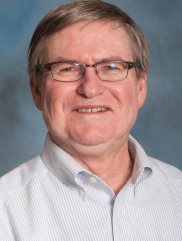
CHESTER MATHIS
Short Bio
Chester Mathis, PhD, has a long-standing interest in applying synthetic radiochemistry techniques to develop PET radiopharmaceuticals to study brain function in vivo. Over the past 25 years, he has focused primarily on the development of radiotracers to image the serotonin and dopamine neuroreceptor systems, as well as agents to evaluate other aspects of normal and abnormal function in the central nervous system using PET imaging techniques. Approximately 10 years ago, Dr. Mathis joined efforts with Dr. William E. Klunk of the Department of Psychiatry at the University of Pittsburgh to devise a PET radiotracer capable of imaging amyloid. This work led to the development of a new class of highly successful radiopharmaceutical agents, among which is Pittsburgh Compound-B, to non-invasively assess amyloid load in the living human brain using PET imaging methodology.
As the Director of the University of Pittsburgh PET Facility, Dr. Mathis works closely with more than 25 University of Pittsburgh investigators from 8 departments on more than 70 PET research imaging protocols in animals and human subjects. These projects include neuroscience, diabetes, and oncology research studies using more than 40 different PET radiotracers to image a variety of biological processes in animals and human subjects.

MARIA CARRILLO
Short Bio
As chief science officer, Maria Carrillo, PhD, sets the strategic vision for the Alzheimer’s Association global research program. Under her leadership, the Association is the world’s largest nonprofit funder of Alzheimer’s research and an internationally recognized pioneer in convening the dementia science community to accelerate the field. As a noted public speaker, Dr. Carrillo plays an instrumental role in the Association’s efforts to lobby both the public and private sectors for increased funding for the disease.
Dr. Carrillo oversees the implementation of the Association’s growing portfolio of research initiatives, including the Alzheimer’s Association International Conference® (AAIC®), the world’s largest and most influential dementia science meeting, and the Research Roundtable, which enables international scientific, industry and government leaders to work together to overcome shared obstacles in Alzheimer’s science and drug development. In addition, Carrillo manages the World Wide Alzheimer’s Disease Neuroimaging Initiative (WW-ADNI), a multi-country research effort aimed at accelerating the early detection of Alzheimer’s.
Under Dr. Carrillo’s direction, the Association’s leadership in Alzheimer’s research continues to thrive through its International Research Grants Program, which has invested over $475 million in promising and innovative science since 1982. In addition, the Association has expanded its role in advancing dementia science by becoming directly involved in research. Dr. Carrillo is a co-primary investigator for the Association-funded and -led U.S. POINTER study, a lifestyle intervention trial to prevent cognitive decline and dementia.
Dr. Carrillo earned her doctorate from Northwestern University’s Institute for Neuroscience and completed a postdoctoral fellowship focused on Alzheimer’s brain imaging and risk factors at Rush University Medical Center in Chicago.
HAI 2025 PROGRAM COMMITTEE
Suzanne Baker, PhD, Lawrence Berkeley National Laboratory
Tobey Betthauser, PhD, University of Wisconsin
Marianne Chapleau, PhD, Life Molecular Imaging
Brad Christian, PhD, University of Wisconsin
Anne Cohen, PhD, University of Pittsburgh
Teresa Gomez-Isla, MD, Massachusetts General Hospital
Ansel Hillmer, PhD, University of Michigan
Kenji Ishii, MD, Tokyo Metropolitan Inst. of Gerontology
Milos Ikonomovic, MD, University of Pittsburgh
Clifford R. Jack, MD, Mayo Clinic
Heidi Jacobs, PhD, Massachusetts General Hospital
Renaud La Joie, PhD, University of California, San Francisco
Susan Landau, PhD, University of California, Berkeley
Laetitia Lemoine, PhD, Perceptive
Beth Mormino, PhD, Stanford University
Melissa Murray, PhD, Mayo Clinic
Agneta Nordberg, MD, PhD, Karolinska Institute
Rik Ossenkoppele, PhD, VU University Medical Center
Julie Ottoy, PhD, University of Toronto
Julie Price, PhD, Harvard Medical School
Gil Rabinovici, MD, University of California, San Francisco
Susan Resnick, PhD, National Institute on Aging
Dorene Rentz, PsyD, Brigham and Women’s Hospital
Pedro Rosa-Neto, MD, PhD, McGill University
Stephen Salloway, MD, Brown University
Sandra Sanabria, PhD, Genentech
Suzanne Schindler, MD, PhD, Washington University in St Louis
Christopher Schwarz, PhD, Mayo Clinic
Reisa Sperling, MD, Brigham and Women’s Hospital
Rik Vandenberghe, MD, PhD, KU Leuven
Victor Villemagne, MD, University of Pittsburgh
Sylvia Villeneuve, PhD, McGill University
Christina Young, PhD, Stanford University
Henrik Zetterberg, MD, University of Gothenburg
HAI 2025 THEME CO-CHAIRS
Suzanne Baker, PhD, Lawrence Berkeley National Laboratory
Tobey Betthauser, PhD, University of Wisconsin
Anne Cohen, PhD, University of Pittsburgh
Brad Christian, PhD, University of Wisconsin
Teresa Gomez-Isla, MD, Massachusetts General Hospital
Ansel Hillmer, PhD, University of Michigan
Milos Ikonomovic, MD, University of Pittsburgh
Heidi Jacobs, PhD, Massachusetts General Hospital
Thomas Karikari, PhD, University of Pittsburgh
Susan Landau, PhD, University of California, Berkeley
Laetitia Lemoine, PhD, Perceptive
Beth Mormino, PhD, Stanford University
Melissa Murray, PhD, Mayo Clinic
Julie Price, PhD, Harvard Medical School
Gil Rabinovici, MD, University of California, San Francisco
Pedro Rosa-Neto, PhD, McGill University
Suzanne Schindler, MD, PhD, Washington University in St Louis
Henrik Zetterberg, MD, University of Gothenburg
HAI 2025 Young Investigator Award Judges
Hartmuth Kolb, PhD, Enigma Biomedical Group
Dawn Matthews, PhD, ADM Diagnostics
Michael Pontecorvo, PhD, Avid Radiopharmaceuticals
Sandra Sanabria, PhD, Genentech
HAI 2024 PROGRAM COMMITTEE
Suzanne Baker, PhD, Lawrence Berkeley National Laboratory
Tobey Betthauser, PhD, University of Wisconsin
Brad Christian, PhD, University of Wisconsin
Anne Cohen, PhD, University of Pittsburgh
Teresa Gomez-Isla, MD, Massachusetts General Hospital
Roger Gunn, PhD, Imperial College
Ansel Hillmer, PhD, Yale University
Kenji Ishii, MD, Tokyo Metropolitan Inst. of Gerontology
Milos Ikonomovic, MD, University of Pittsburgh
Clifford R. Jack, MD, Mayo Clinic
Heidi Jacobs, PhD, Massachusetts General Hospital
Renaud La Joie, PhD, University of California, San Francisco
Susan Landau, PhD, University of California, Berkeley
Laetitia Lemoine, PhD, Invicro
Beth Mormino, PhD, Stanford University
Melissa Murray, PhD, Mayo Clinic
Agneta Nordberg, MD, PhD, Karolinska Institute
Rik Ossenkoppele, PhD, VU University Medical Center
Julie Ottoy, PhD, University of Toronto
Julie Price, PhD, Harvard Medical School
Gil Rabinovici, MD, University of California, San Francisco
Susan Resnick, PhD, National Institute on Aging
Dorene Rentz, PsyD, Brigham and Women’s Hospital
Pedro Rosa-Neto, MD, PhD, McGill University
Stephen Salloway, MD, Brown University
Sandra Sanabria, PhD, Genentech
Suzanne Schindler, MD, PhD, Washington University in St Louis
Christopher Schwarz, PhD, Mayo Clinic
Reisa Sperling, MD, Brigham and Women’s Hospital
Rik Vandenberghe, MD, PhD, KU Leuven
Victor Villemagne, MD, University of Pittsburgh
Sylvia Villeneuve, PhD, McGill University
Christina Young, PhD, Stanford University
Henrik Zetterberg, MD, University of Gothenburg
HAI 2024 THEME CO-CHAIRS
Suzanne Baker, PhD, Lawrence Berkeley National Laboratory
Tobey Betthauser, PhD, University of Wisconsin
Anne Cohen, PhD, University of Pittsburgh
Brad Christian, PhD, University of Wisconsin
Teresa Gomez-Isla, MD, Massachusetts General Hospital
Ansel Hillmer, PhD, Yale University School of Medicine
Milos Ikonomovic, MD, University of Pittsburgh
Heidi Jacobs, PhD, Massachusetts General Hospital
Thomas Karikari, PhD, University of Pittsburgh
Susan Landau, PhD, University of California, Berkeley
Laetitia Lemoine, PhD, Invicro
Beth Mormino, PhD, Stanford University
Melissa Murray, PhD, Mayo Clinic
Julie Price, PhD, Harvard Medical School
Gil Rabinovici, MD, University of California, San Francisco
Pedro Rosa-Neto, PhD, McGill University
Suzanne Schindler, MD, PhD, Washington University in St Louis
Henrik Zetterberg, MD, University of Gothenburg
HAI 2024 Young Investigator Award Judges
Hartmuth Kolb, PhD, Johnson & Johnson
Michael Pontecorvo, PhD, Avid Radiopharmaceuticals
Christopher Rowe, PhD, Austin Health
John Seibyl, PhD, Invicro
HAI 2023 PROGRAM COMMITTEE
Olivier Barret, PhD, MIRCen, CEA
Tobey Betthauser, PhD, University of Wisconsin
Brad Christian, PhD, University of Wisconsin
Teresa Gomez-Isla, MD, Massachusetts General Hospital
Roger Gunn, PhD, Imperial College
Ansel Hillmer, PhD, Yale University School of Medicine
Kenji Ishii, MD, Tokyo Metropolitan Inst. of Gerontology
Milos Ikonomovic, MD, University of Pittsburgh
Clifford R. Jack, MD, Mayo Clinic
Robert A. Koeppe, PhD, University of Michigan
Laetitia Lemoine, PhD, Karolinska Institute
Mark Lubberink, PhD, Uppsala University
Beth Mormino, PhD, Stanford University
Melissa Murray, PhD, Mayo Clinic
Agneta Nordberg, MD, PhD, Karolinska Institute
Rik Ossenkoppele, PhD, VU University Medical Center Amsterdam
Denise Park, PhD, University of Texas
Julie Price, PhD, Harvard Medical School
Gil Rabinovici, MD, University of California, San Francisco
Susan Resnick, PhD, National Institute on Aging
Juha Rinne, MD, PhD, University of Turku
Stephen Salloway, MD, Brown University
Sandra Sanabria, PhD, Genentech
Reisa Sperling, MD, Brigham and Women’s Hospital
Rik Vandenberghe, MD, PhD, KU Leuven
Victor Villemagne, MD, The University of Melbourne
Sylvia Villeneuve, PhD, McGill University
HAI 2023 THEME CO-CHAIRS
Suzanne Baker, PhD, Lawrence Berkeley National Laboratory
Tobey Betthauser, PhD, University of Wisconsin
Anne Cohen, PhD, University of Pittsburgh
Brad Christian, PhD, University of Wisconsin
Ansel Hillmer, PhD, Yale University School of Medicine
Milos Ikonomovic, MD, University of Pittsburgh
Heidi Jacobs, PhD, Massachusetts General Hospital
Susan Landau, PhD, University of California, Berkeley
Laetitia Lemoine, PhD, Karolinska Institute
Beth Mormino, PhD, Stanford University
Melissa Murray, PhD, Mayo Clinic
Julie Price, PhD, Harvard Medical School
Gil Rabinovici, MD, University of California, San Francisco
Pedro Rosa-Neto, PhD, McGill University
Suzanne Schindler, MD, PhD, Washington University in St Louis
Henrik Zetterberg, MD, University of Gothenburg
HAI 2023 Young Investigator Award Judges
Hartmuth Kolb, PhD, Johnson & Johnson
Michael Pontecorvo, PhD, Avid Radiopharmaceuticals
Christopher Rowe, PhD, Austin Health
John Seibyl, PhD, Institute for Neurodegenerative Disorders
HAI 2020 PROGRAM COMMITTEE
Olivier Barret, PhD, MIRCen, CEA
Tobey Betthauser, PhD, University of Wisconsin
Brad Christian, PhD, University of Wisconsin
Teresa Gomez-Isla, MD, Massachusetts General Hospital
Roger Gunn, PhD, Imperial College
Ansel Hillmer, PhD, Yale University School of Medicine
Kenji Ishii, MD, Tokyo Metropolitan Inst. of Gerontology
Milos Ikonomovic, MD, University of Pittsburgh
Clifford R. Jack, MD, Mayo Clinic
Robert A. Koeppe, PhD, University of Michigan
Laetitia Lemoine, PhD, Karolinska Institute
Mark Lubberink, PhD, Uppsala University
Beth Mormino, PhD, Stanford University
Melissa Murray, PhD, Mayo Clinic
Agneta Nordberg, MD, PhD, Karolinska Institute
Rik Ossenkoppele, PhD, VU University Medical Center Amsterdam
Denise Park, PhD, University of Texas
Julie Price, PhD, Harvard Medical School
Gil Rabinovici, MD, University of California, San Francisco
Susan Resnick, PhD, National Institute on Aging
Juha Rinne, MD, PhD, University of Turku
Stephen Salloway, MD, Brown University
Sandra Sanabria, PhD, Genentech
Reisa Sperling, MD, Brigham and Women’s Hospital
Rik Vandenberghe, MD, PhD, KU Leuven
Victor Villemagne, MD, The University of Melbourne
Sylvia Villeneuve, PhD, McGill University
HAI 2020 THEME CO-CHAIRS
Tobey Betthauser, PhD, University of Wisconsin
Brad Christian, PhD, University of Wisconsin
Ansel Hillmer, PhD, Yale University School of Medicine
Milos Ikonomovic, MD, University of Pittsburgh
Laetitia Lemoine, PhD, Karolinska Institute
Beth Mormino, PhD, Stanford University
Melissa Murray, PhD, Mayo Clinic
Julie Price, PhD, Harvard Medical School
Gil Rabinovici, MD, University of California, San Francisco
HAI 2019 PROGRAM COMMITTEE
Olivier Barrett, PhD
Tammie Benzinger, MD, PhD, Washington University in St. Louis
Tobey Betthauser, PhD, University of Wisconsin
Brad Christian, PhD, University of Wisconsin
Teresa Gomez-Isla, MD, Massachusetts General Hospital
Roger Gunn, PhD, Imperial College
Kenji Ishii, MD, Tokyo Metropolitan Inst. of Gerontology
Milos Ikonomovic, MD, University of Pittsburgh
Clifford R. Jack, MD, Mayo Clinic
Robert A. Koeppe, PhD, University of Michigan
Laetitia Lemoine, PhD, Karolinska Institute
Mark Lubberink, PhD, Uppsala University
Beth Mormino, PhD, Stanford University
Melissa Murray, PhD, Mayo Clinic
Agneta Nordberg, MD, PhD, Karolinska Institute
Rik Ossenkoppele, PhD, VU University Medical Center Amsterdam
Denise Park, PhD, University of Texas
Julie Price, PhD, Harvard Medical School
Gil Rabinovici, MD, University of California, San Francisco
Susan Resnick, PhD, National Institute on Aging
Juha Rinne, MD, PhD, University of Turku
Stephen Salloway, MD, Brown University
Sandra Sanabria, PhD, Genentech
Reisa Sperling, MD, Brigham and Women’s Hospital
Rik Vandenberghe, MD, PhD, KU Leuven
Victor Villemagne, MD, The University of Melbourne
Sylvia Villeneuve, PhD, McGill University
HAI 2019 THEME CO-CHAIRS
Tobey Betthauser, PhD, University of Wisconsin
Brad Christian, PhD, University of Wisconsin
Ansel Hillmer, PhD, Yale University School of Medicine
Milos Ikonomovic, MD, University of Pittsburgh
Laetitia Lemoine, PhD, Karolinska Institute
Beth Mormino, PhD, Stanford University
Melissa Murray, PhD, Mayo Clinic
Julie Price, PhD, Harvard Medical School
Gil Rabinovici, MD, University of California, San Francisco
HAI 2018 PROGRAM COMMITTEE
Thomas Beach, MD, PhD, Banner Health
Tammie Benzinger, MD, PhD, Washington University in St. Louis
Nenad Bogdanovic, PhD, University of Oslo
Gael Chetelat, PhD, INSERM/University of Caen Basse-Normandie
Brad Christian, PhD, University of Wisconsin
Teresa Gomez-Isla, MD, Massachusetts General Hospital
Roger Gunn, PhD, Imperial College
Kenji Ishii, MD, Tokyo Metropolitan Inst. of Gerontology
Milos Ikonomovic, MD, University of Pittsburgh
Clifford R. Jack, MD, Mayo Clinic
Robert A. Koeppe, PhD, University of Michigan
Mark Lubberink, PhD, Uppsala University
Beth Mormino, PhD, Stanford University
Melissa Murray, PhD, Mayo Clinic
Agneta Nordberg, PhD, Karolinska Institute
Rik Ossenkoeppele, PhD, VU University Medical Center Amsterdam
Denise Park, PhD, University of Texas
Julie Price, PhD, Harvard Medical School
Gil Rabinovici, MD, University of California, San Francisco
Susan Resnick, PhD, National Institute on Aging
Juha Rinne, MD, PhD, University of Turku
Sandra Sanabria, PhD, Genentech
Reisa Sperling, MD, Brigham and Women’s Hospital
Victor Villemagne, MD, The University of Melbourne
Sylvia Villeneuve, PhD, McGill University
HAI 2018 THEME CO-CHAIRS
Brad Christian, PhD, University of Wisconsin
Milos Ikonomovic, MD, University of Pittsburgh
Beth Mormino, PhD, Stanford University
Melissa Murray, PhD, Mayo Clinic
Julie Price, PhD, Harvard Medical School
Gil Rabinovici, MD, University of California, San Francisco
HAI 2017 PROGRAM COMMITTEE
Tammie Benzinger, MD, PhD, Wash. Univ. in St. Louis
Brad Christian, PhD, University of Wisconsin
Kenji Ishii, MD, Tokyo Metropolitan Inst. of Gerontology
Milos Ikonomovic, MD, University of Pittsburgh
Clifford R. Jack, MD, Mayo Clinic
Robert A. Koeppe, PhD, University of Michigan
Beth Mormino, PhD, Harvard Medical School
Melissa Murray, PhD, Mayo Clinic
Agneta Nordberg, PhD, Karolinska Institute
Denise C. Park, PhD, University of Texas
Julie Price, PhD, Harvard Medical School
Gil Rabinovici, MD, Univ. of California, San Francisco
Susan M. Resnick, PhD, National Institute on Aging
Juha O. Rinne, MD, PhD, University of Turku
Reisa Sperling, MD, Brigham and Women’s Hospital
Victor Villemagne, MD, The University of Melbourne
HAI 2017 THEME CO-CHAIRS
Brad Christian, PhD, University of Wisconsin
Milos Ikonomovic, MD, University of Pittsburgh
Beth Mormino, PhD, Stanford University
Melissa Murray, PhD, Mayo Clinic
Julie Price, PhD, Harvard Medical School
Gil Rabinovici, MD, University of California, San Francisco
HAI 2016 PROGRAM COMMITTEE
HAI 2015 PROGRAM COMMITTEE
HAI 2014 PROGRAM COMMITTEE
HAI 2013 PROGRAM COMMITTEE
HAI 2012 PROGRAM COMMITTEE
PAST PROGRAMS, KEYNOTE VIDEOCASTS and SPONSORS

